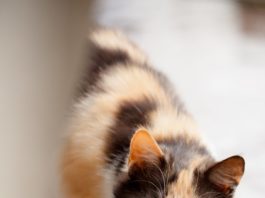How Smart Is Your Cat?
Many people regard cats as being resourceful and self-reliant. After all, the species has survived thousands of years in radically different environments and living conditions. But how smart are our domestic cats? We humans tend to be very biased in assessing the intelligence of our cats (and dogs). That’s because we usually choose to judge them according to traits that we can relate to as human beings. When cats do something entertaining or display their independence, we generally think of them as intelligent.
Here, Kitty, Kitty: Will She Listen to You?
There’s a lighthearted saying that goes something like this: “Dogs come when called. Cats take a message and get back to you.” For anyone who has ever shared their home with both canine and feline friends, you know this statement is true! But it doesn’t have to be that way. You can use a training method like “clicker training” or “target training” to reward your cat when she performs a certain task. The clicker [an inexpensive, hand-held device that makes a distinct “clicking” sound] can tell a cat that she just did something her person liked and a treat is coming.
Do Cats Grieve: It Appears They Do
One of your beloved cats died several weeks ago, and you’ve been feeling pretty down. Friends who have been through the same experience tell you this is normal after such a loss. But then you notice that your other cat is eating less, and wanders around the house, yowling, as if he was looking for his lost companion. Do cats grieve like we do? And if so, how can we help them? There is now evidence that animals experience emotional responses to significant changes in their environment — and this includes going through the grieving process after the loss of feline or human companions.
Ask Elizabeth: December 2011
Dear Elizabeth: I have a five-year-old indoor cat, Baby, with whom I’ve shared my home ever since she was born. I’ve never had any other companion animals, so it’s been just Baby and me for all that time. Here’s my problem: I recently became engaged and at some point in the near future will be moving into my fiance’s home. He has two cats — both females. One is just about Baby’s age and the other is probably about seven years old. Neither one of them is very friendly. Naturally, I’m concerned about moving Baby into this new environment. I’m afraid that the animals will fight and hurt each other. I’ll appreciate any advice on how I can best address this dilemma.
Does Your Cat Need a Specialist?
Litter box aversion. Aggression. Inappropriate scratching or destructive behavior. Eating or chewing non-food materials. Cat carrier avoidance. Separation anxiety. Other fears and phobias that make you and your cat unhappy. When your cat develops a behavior problem, you may need professional advice. But whom should you call? Your veterinarian should be first on the list to rule out any medical problems. But after your cat’s clean bill of health, your veterinarian may suggest the help of a certified applied animal behaviorist or a board-certified veterinary behaviorist. While either one can help you solve your cat’s adjustment difficulty, there are some differences in the services each provides.
Mixing Cats and Kids Safely
Who isn’t charmed by photographs of kids holding and petting cute, cuddly kittens? Children can benefit from having a cat, and vice versa. “The experience of bonding between the child and the cat can be invaluable,” says Larry Lachman, PsyD, a licensed clinical psychologist, animal behavior consultant and author of Cats on the Counter: Therapy and Training for Your Cat, “and a child learns to increase compassion and empathy for nonhuman life.” Pets teach children the responsibility of doing chores like feeding the cat, changing the water and cleaning the litter box. Having a pet can also provide a family with its own pet-assisted therapy.
Is It Urine Marking or Incontinence?
When a cat begins soiling the house, it is usually assumed that it is a behavioral problem or the onset of senility. However, there are several medical conditions that can cause urinary incontinence and inappropriate urination, some of which require immediate treatment. First, it is important to distinguish between incontinence and inappropriate urination. True incontinence occurs when a cat does not have voluntary control over urination; trauma, a weak primary sphincter muscle and congenital abnormalities are the most common causes of incontinence.
How to Foil the Feline Houdini
Here are ways to prevent your cat from making that mad dash out the door.
When Your Cat Dislikes Company
When Safflower, a 12-week-old female kitten, earnestly beckoned from her cage in a Manhattan animal shelter, Deirdre knew she was the one for her. The kitten settled in quickly with Deirdre and her two roommates in a small apartment. Safflower loved everyone; Deirdre was even jealous when Safflower would occasionally sleep on her roommates beds instead of her own. The growing kitten played and romped with visitors, and even greeted people at the door.
Make Safe Cat-Dog Introductions
Some folks are "dog people," while others have an affinity for cats. But what do you do when enthusiasts of both persuasions share the same home? Despite the conventional wisdom that dogs and cats cant peacefully coexist, both species can inhabit the same space without the fur flying. However, introducing a cat into a dog-centric home requires planning, patience and a commitment to the process. How long it takes to successfully integrate a new cat with a dog depends on the situation, says Katherine Houpt, VMD, PhD, board-certified by the American College of Veterinary Behaviorists and emeritus professor of animal behavior in Cornell Universitys College of Veterinary Medicine. "It can take anywhere from days to weeks, and it varies a lot with the dogs reaction," she says. "I think its important to increase exposure gradually when doing an introduction so you can monitor both animals reactions. That usually happens over a number of days."
Cats and Kids Living Together Safely
Who isnt charmed by the image of an adorable kid holding and petting a cute, fluffy kitten? Children can benefit from having a cat, and vice versa. "The experience of bonding between the child and the cat can be invaluable," says Larry Lachman, PsyD, a licensed clinical psychologist, animal behavior consultant and author of Cats on the Counter: Therapy and Training for Your Cat, "and a child learns to increase compassion and empathy for nonhuman life."
Your Cats Keen Sense of Smell
When it comes to nosing around, a cat has a major advantage over its human caregiver. The adorable feline that occupies your house has a whopping 60-to-80 million olfactory cells compared to a humans five-to-20 million cells. Because of their well-equipped noses, cats may use their sense of smell as the primary way of interacting with their environment. "They have a large olfactory area in the nose and do a lot of sniffing," says Katherine A. Houpt, VMD, PhD, the emeritus James Law Professor of Animal Behavior at Cornells College of Veterinary Medicine.

















